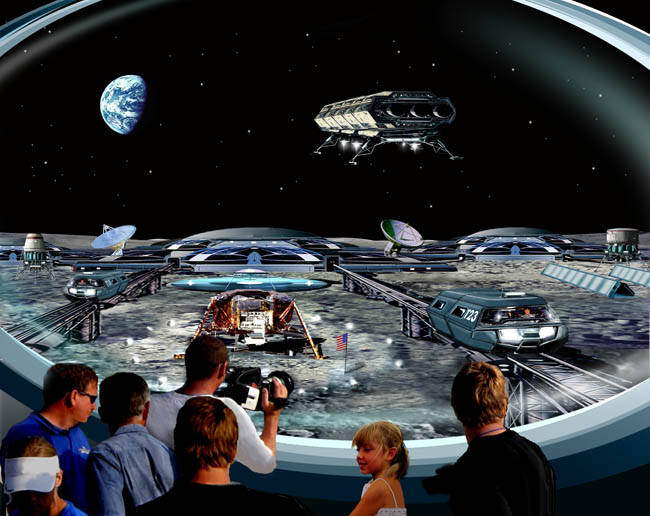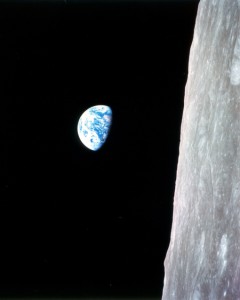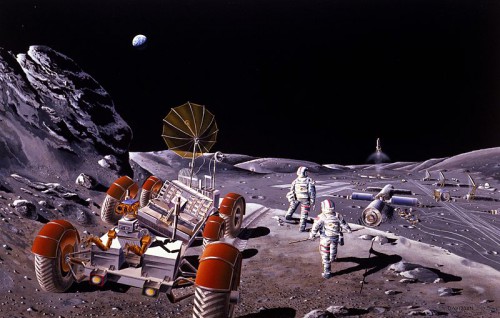
If we are to believe certain narrow-minded people — and what else can we call them? — humanity is confined within a circle of Popilius from which there is no escape, condemned to vegetate upon this globe, never able to venture into interplanetary space! That’s not so! We are going to the moon, we shall go to the planets, we shall travel to the stars just as today we go from Liverpool to New York, easily, rapidly, surely, and the oceans of space will be crossed like the seas of the moon.
— Jules Verne, ‘From the Earth to the Moon’ (1865 – Walter James Miller translation, 1978).
It is the year 2150. The Moon harbors a settlement of approximately 50,000 people, mostly comprised by miners and workers, employed by the big lunar mining and solar power consortiums. They are responsible for providing for the energy sources that sustain all the colonies throughout the Earth-Moon system, and a big part of the Home Planet as well. But it’s not only business on the Moon, for a big part of the lunar population is just there for pleasure. The cislunar transportation networks are always filled with a steady stream of tourists, regularly visiting their private properties and other recreation facilities on the Moon. When someone feels the need to just relax and escape the everyday routine of life on Earth, the sight of the Blue Marble over the grey lunar regolith in Armstrong City is one of his first choices—and one of the most cherished tourist destinations in the inner Solar System. And those travelers are always welcome there, because they have always been a major source of income for the lunar economy.
Many space advocates would argue that the prosperous future depicted above, although frustratingly delayed, is ultimately inevitable. And they have maintained for decades that the reason for any lack of progress toward realising that future has mostly been due to the lack of adequate funding and subsequent political will. But it may be that funding doesn’t even make for half the reasons for such lack of progress.

Forty five years ago this month, Apollo 8 became the first manned spacecraft to orbit the Moon, during an epic mission that fulfilled a centuries-old dream. One of the lasting legacies of this mission (and possibly of the whole Space Age) is the iconic “Earthrise” photograph of our Home Planet, seen by human eyes from the Moon for the first time. This sight helped to create a paradigm shift within humanity’s collective conscience, bringing home the reality of our place in the Universe more than anything else before it. It also helped to give a tremendous boost to the environmental movement that recognised the importance of environmental conservation and caring for Earth’s biodiversity while seeking the balance between growth and care for the environment—an important and necessary realisation for any maturing civilisation interested in its long-term survival.
According to the Merriam-Webster online dictionary, environmentalism is described as “an advocacy of the preservation, restoration, or improvement of the natural environment; especially : the movement to control pollution.” As a contemporary movement in the U.S., environmentalism was heavily influenced during the 1960s by two best-selling books: Rachel Carson’s “Silent Spring” and Paul and Ann Ehrlich’s “The Population Bomb.” Although later heavily criticized for their blatant inaccuracies, exaggerations, overt fear-mongering, and apocalyptic predictions that were ultimately proved wrong, both books had a large impact among the general public and government policy at the time, and still do to this day. Ehrlich’s book, in particular, could be viewed as a repetition of scholar Thomas Malthus‘ 18th-century apocalyptic visions of global starvation, hunger, and environmental catastrophe by exponential population growth.

A side-effect of the impact that those books had in society and public policy was the resurrection and advancement of Malthus’ ideas, which have gained much popularity and acceptance within the academic community, government, and the general public alike. Ideas that have created a mindset that more or less sees humanity as a virus, a disease that threatens the existence of the whole Earth’s biosphere and the rest of the Solar System as well, if it was left to expand beyond this planet. “According to this idea, humans are a cancer upon the Earth, a horde of vermin, whose unconstrained aspirations and appetites are endangering the natural order,” writes Robert Zubrin in his book “Merchants of Despair: Radical Environmentalists, Criminal Pseudo-Scientists, and the Fatal Cult of Antihumanism.” “This is the core idea of anti-humanism. One does not provide liberty to vermin. One does not seek to advance the cause of a cancer.”
Making such an assertion today would surely raise quite a few eyebrows. After all, who would want to honestly not care for the well-being of Earth and its environment? And since human activities are harmful to the environment, shouldn’t such activities be restrained? But this question just misses the point. For the point is not to be uncaring for the Earth, but to find the right balance so that we don’t impede and stop human progress in the process.
“Anti-humanism is not environmentalism, though it sometimes masquerades as such,” writes Zubrin. “Environmentalism properly conceived, is an effort to apply practical solutions to real environmental problems, such as air and water pollution, for the purpose of making the world a better place for all humans to thrive in. Anti-humanism in contrast, rejects the goal of advancing the cause of mankind. Rather it uses instances of inadvertent human damage to the environment as points of agitation, to promote its fundamental thesis that human beings are pathogens, whose activities need to be suppressed in order to protect a fixed ecological order, with interests that stand above those of humanity.” And this “human virus’ philosophy” has major consequences on the efforts of advancing a space-faring civilisation as well.

It is not uncommon nowadays for space advocates to promote their visions of space settlement, and have them receive a mild hostility from the general public. Why would we want to pollute and infect the rest of the Universe with our presence? Haven’t we made enough damage to the Earth already? These are counter-arguments so often used by people who oppose the idea of humanity’s expansion out in the Cosmos. For someone accepting that humanity is inherently bad for the Earth and the rest of the Universe, the space program represents a threat to the preservation of that environment. The lack of progress toward advancing a space-faring civilisation hasn’t been caused primarily by lack of adequate funding. Global wealth is sufficient enough to allow us to care for the well-being of the Earth and its citizens, while allowing for an ambitious space program at the same time. A program that could ultimately lead to humanity’s expansion into the Solar System, an endeavour that would provide even more unimaginable benefits in return. Lack of funding has always been used as a marvelous excuse for hiding deeper ideological and emotional oppositions toward human space exploration and settlement. Fear of space itself, coupled with hysteria over the possibility of polluting it with our presence, are some of those reasons. If those deeper reasons aren’t addressed, we’ll continue to be Earth-bound, constantly dreaming of the stars but never actually getting there.
We could begin then by examining the idea of the “human virus.” Is it a legitimate one? Let’s think about it for a while.

One could start by asking, what is a virus? According to the Farlex free online dictionary, a virus is “any of various simple submicroscopic parasites of plants, animals, and bacteria that often cause disease and that consist essentially of a core of RNA or DNA surrounded by a protein coat. Unable to replicate without a host cell, viruses are typically not considered living organisms.” The Merriam-Webster online dictionary gives a somewhat different definition: “An extremely small living thing, that causes a disease and that spreads from one person or animal to another.” After establishing a definition of what a virus is, we could then examine if this definition applies to the human species.
Homo sapiens has the ability to reproduce without the need to attach himself to an external host organism. The very act of reproduction doesn’t spread any particular disease that threatens the rest of the biosphere. If indeed that was the case, Homo sapiens would have been fatal to the Earth since the appearance of its first hominid ancestors hundreds of thousands of years ago. A virus, on the other hand, doesn’t have the ability to choose whether to infect a living cell or not. Its very nature demands that it does so, or else it perishes. It is genetically programmed to act this way.
No one could argue that human activity on this planet hasn’t been disastrous to the environment. But these disastrous effects have come by conscious choice and neglect, not because humanity’s nature is infectious and disastrous per se. But claiming that human kind is a disease that should be controlled omits the fact that Homo sapiens, in contrast to all the other animals on Earth, can choose and change behavior and destiny, for better or for worse, and that nothing is predetermined, genetically or otherwise.

Billions of years ago, life first began in the Earth’s seas. Under the guidance of evolution and natural selection, those first marine organisms later colonised the land. It was one of life’s major evolutionary steps, for it helped to create a much bigger biodiversity than could have ever been possible before. As a human species, we owe our very existence today to that great evolutionary step. Did sea life pollute the Earth’s pristine environments by expanding on the land? Should they have been kept confined in their own sea environment so that the Earth could be kept “clean”? Was it unethical on their part to come out of the sea? For that reason, was it unethical for the first human species to come out of the African savannas and colonise the rest of the land?
The very nature of life itself is to expand and colonise new places and new territories. When it doesn’t and is kept stagnant and idle, life ultimately perishes.
Yet, the thinking that humanity is just a pollutant to the environment suggests that it should be kept off-limits from the rest of the Universe as well. And this thinking is shared among many, even within academia. In a recently published book called “Encountering Life in the Universe: Ethical Foundations and Social Implications of Astrobiology,” authors Chris Impey, Anna H. Spitz, and William Stoeger explore the ethical issues of humans interacting with extraterrestrial life. Dr. Woody Sullivan, an astronomy professor of the University of Washington and one of the contributors to the book’s subject, advocates that humanity should be totally banned from the rest of the Solar System, in the interests of preserving all the pristine extraterrestrial environments and their possible habitats. He proposes an Antarctic Treaty equivalent that bans extensive human habitation of the Solar System. “The Solar System is our last great wilderness,” he argues. “We must begin now, to act to keep it untrammeled by human action.”
If that thinking prevails and finds its way into public policy, it could mean humanity’s indefinite confinement on Earth. Debates over the value of public versus private space programs that are so prevalent today won’t matter either. It would be bad news for all the emerging private companies as well that wish to mine asteroids and other planetary bodies for their precious resources. ‘There is the view that it’s just unethical to destroy another celestial body … but then [people] also question if it is right for a profit-making company to make massive profits from [mining planetary bodies], says Dr. Alice Gorman, a researcher in the field of space archaeology at Flinders University, Australia.

We’re far from the future depicted in the beginning of this article. But at some point in the (hopefully not too distant) future, when the technology has sufficiently advanced, we will be forced to consider if this vision of space settlement is something we will want to pursue. And the most deciding factor might not be financial cost, political will, or funding, rather it will be the way we view ourselves: Will we see us as something positive, to be cherished and expanded into the rest of the Cosmos, or as something negative, a deadly disease that deserves to be controlled and ultimately wiped out? “There was a time when humanity looked in the mirror and saw something precious, worth protecting and fighting for, indeed, worth liberating,” comments Zubrin.
As a species, the answer to the question of how we view ourselves in regard to the rest of the Universe might ultimately be the most important decision we will ever make.
The opinions presented in this article belong solely to the author and do not necessarily represent those of AmericaSpace.
The author would like to extend his best wishes for the New Year to all the readers of AmericaSpace.
Want to keep up-to-date with all things space? Be sure to “Like” AmericaSpace on Facebook and follow us on Twitter: @AmericaSpace




Amen!
Leonidas, this is clearly one of your finest works to date. A remarkable, truly remarkable, piece of research and writing. I only hope that individuals of consequence in matters of space policy such as congressional staffers, university professors, individuals at the Space Policy Institute, AIAA, National Space Society, etc. have access to this exceptional work. Somehow, important individuals who are listened to and respected in the halls of power must read this. Even a powerless little key-pounder like yours truly can recognize excellence when he sees it! Bravo Leonidas, BRAVO!!
Thank you Karol! I’m always humbled and exhilarated by your intelligent commentary. The fact that you provide such positive commentary and support, makes all the late-night work for the articles really worth it!
I too have given a lot of thought, as to how this message could be brought home to all the people influencing and dictating public policy. There’s so much important work been done by all the space advocacy groups and organisations like the NSS, the SFF, the Planetary Society and others. Yet, it seems that there’s something missing, that small clue, detail or approach, that would really make the difference. I suspect that it has to do with a general lack of unity that characterises the space community. Arguments over destinations, approaches and philosophies, deprive the whole community from the unity it needs to carry the message through.
My deep thanks and respects again, for being such a valuable contributor to the discussions here.
Leonidas
Congratulations for your major contribution to the fight against Environmental totalitarianism. This fight has been going on for a long time. In my 1998 chapter for the book “Solar Power Satellites”, I covered the energy aspect of this fight in detail. Here are some quotes that show the totally radical, irrational and anti-human outlook of the groups.
“Both history and proper humility urge us to view our current crop of problems as calling for a wisdom within the bounds of what we know best – a wisdom that sees the human species, indefinitely, if not forever, as bound to the Earth.” Regan, Tom (1986) Earthbound, Temple University Press, Philadelphia. PA. p 36.
“It would be little short of disastrous for us to discover a source of clean, cheap, abundant energy because of what we might do with it. We ought to be looking for energy sources … that don’t give us the excesses of concentrated energy with which we could do mischief to the earth and each other.” Lovins, Amory (1977) Quoted in “The Ploughboy Interview” in Mother Earth News, Nov, Dec 1977, p 22.
“Humans are destructive in proportion to their supposition of abundance; if they are faced with an infinite abundance (of energy), they will become infinitely destructive.” Berry, Wendell (1977) “Letter to the Editor” in Space Colonies, Ed. Stewart Brand Penguin Books, New York, p 36-37
“Giving Society cheap, abundant energy … would be the equivalent of giving an idiot child a machine gun” Erlich, Paul (1975) “An Ecologist’s Perspective on Nuclear Power” in F. A. S. Public Issue Report, May-June.
Keep up the good fight!
John K Strickland
member NSS Board of Directors
Advocate: Space Frontier Foundation
Mr. Strickland,
Thank you very much. I’m humbled by your taking the time to provide your insightfuls comments.
Indeed, this ideological fight has been going on even before the dawn of the Space Age. The quotes that you have provided, really bring home the grave danger that the Earth-bound, ‘closed borders’ ideology represents not only to humanity’s prosperity, but its very survival as well.
I have many times wondered and given serious thought, as to what would be the best way, that space advocates such as those at the Space Frontier Foundation and other similar organisations, could unite to carry the message of prosperity and the hope that a human future in space coud provide, through to all the policy makers. I can only hope that the message carried in this article can spread, so as to awaken even more people to the reality of the situation, and to the hopeful and prosperous future that the creation of a space-faring civilisation would enable.
With sincere and kind regards,
Leonidas Papadopoulos
It is inconceivable that human beings would “concede defeat” in the exploration of space, if, for no other reason, than our intellect requires exploration and discovery. Remember that our robotic emissaries will precede human colonization by detecting those habitable places in the cosmos. And we while doing so, the ever-sophisticated technologies will be developed to solve the major problems. Naive? Overly optimistic? I think not. We will do it!
Leonidas has written a masterpiece!
I couldn’t agree more Tom! Remember, I’m still saving that place on my front lawn for a “Vasiloff For Congress” sign! I become almost catatonic with disbelief upon the realization that highly intelligent individuals such as Leonidas and yourself who have so much of importance and value to say to our beloved America have no real venue, but a Miley Cyrus need only twerk and the world hangs on her every word. Damn, where’s that bottle of Scotch . . . .
You know Karol, I always thought that your comments about the insulting preeminence of celebrities and media personalities over a brainless general public, were somewhat exaggerated, but after seeing this, I started realising that you’re much more right than I originally have thought – just because I don’t follow the brainless celebrity activity and gossip personally, doesn’t mean that others don’t as well..
Thank you, Karol. As a proud American who has followed spaceflight since Sputnik. I can think of no nobler endeavor than to explore space. We cannot and must not relinquish our leadership role in both robotic and human exploration of the cosmos. You can take that to the bank!
I don’t think there’s any danger of anti-humanists closing off the Solar System to exploitation and settlement. Let’s be frank. If there are valuable resources to be had, then they will be taken. Simple as that.
Maybe you’re right Sam and in the long run indeed, no one will be able to stop humanity’s expansion into the Solar System. But while writing the article, I really wanted to bring home the reality that we’re far from that point in time yet, and the trend goes towards the opposite direction.
Actually, we already know that space is full of valuable resources of infinite quantity. Leaving aside precious asteroid minerals, Helium 3 and the like, its obvious to everyone that the Sun is emitting infinite anounts of solar energy every second, while a proper exploitation of just a tiny amount of that, would make the need for fossil fuels on Earth, obsolete. Maybe tapping into solar energy from space proves to be difficult and costly, but since everyone’s so interested in preserving the Earth’s environment, why are we still burning fossil fuels for energy, polluting the Earth in the process? A question I always have concerning the radical environmental mindset is, isn’t the well-being of the Earth’s environment and its citizens, worth the extra effort and cost of tapping the immense energy resources of the rest of the Universe?
Other major obstacles on the road to Solar System exploitation and settlement are the existence of the current Outer Space Treaty, that kinda prohibits any meaningful activity in space, by excluding property rights and the prohibition of nuclear energy in space, that could really get the ball rolling when it comes to fast interplanetary propulsion – and nuclear energy is a dirty word and a hot topic (and rightfully so to a certain degree). But the thing is, you can’t have both a clean Earth and a Solar System that is closed off to humans at the same time – something’s gotta give.
I do think that radical environmental thinking presents a threat to future Solar System exploitation, because human history has shown that what is logical, isn’t always the thing that prevails. The Outer Space Treaty for instance has closed off the rest of the Solar System to human activity for decades now, allowing only for the scientific inquiry and exploration of space.
The more I look at this kind of thinking, the more it looks to me like a secular version of Calvinism. Namely, the Absolute Depravity of humanity, but without the Irresistible Grace of God. Since it’s secular, it has to be put into scientific language rather than theological, but at its base it’s still Calvin’s notion that the Fall was absolute, and human nature incapable of accomplishing anything positive.
Great insight Leigh! You’re very right, that the ideas at the core of this thinking are theologically-based and it’s a point that I wanted to make in the article. Opposition towards advancing a space-faring civilisation runs deeper than just making financial arguments about budget deficits and the like.
Thank you for your very insightful comment.
A great piece of work that should be read by those in power! I’m all for a clean environment and the preservation of Earth and the rest of the Universe, but I think almost everyone who works in the space business is. What these anti-humans do not realise is that they want something completely different. If they get their wish we will perish indeed, because not only space travel but almost all other forms of science (including those that they claim to rely on) will eventually be non-exsistant. And with that our whole civilisation will fall.
I’m a much more positive person though, because I think we will go to space even when these people get their wish. We explored and colonised before and many of those times a lot of people didn’t like it. And this time around we can even make sure that the colonised places become a better place with no pollution or similar negativities!
Thak you Bram. I have sent an e-mail with the link of the article to the Space Policy Institute. I have a small hope that it could help to generate more discussion on the subject.
Indeed, the people who oppose space exploration and settlement out of fear of polluting extraterrestrial environments, fail to realise that exploitation of space resources, has the potential of alleviating the burden on the Earth’s environment from the burning of fossil fuels. You just can’t have it both ways, a ‘clean’ Earth and a closed-off Solar System at the same time. Something’s gotta give.
Hopefully, properly conceived human progress will prevail.And yes, this time around, with the prospect of space exploitation we will have the chance of doing things better than what we did in the past.